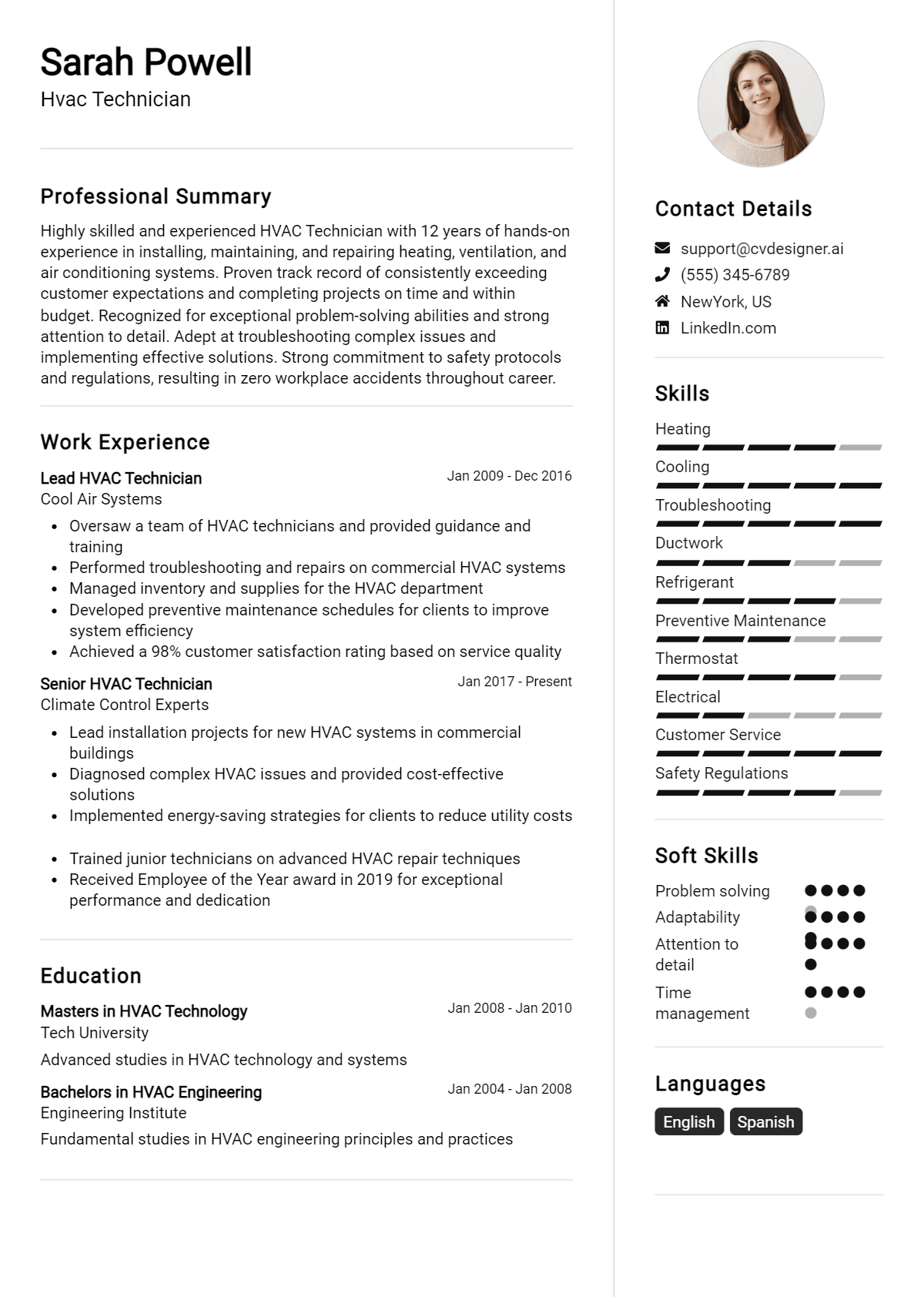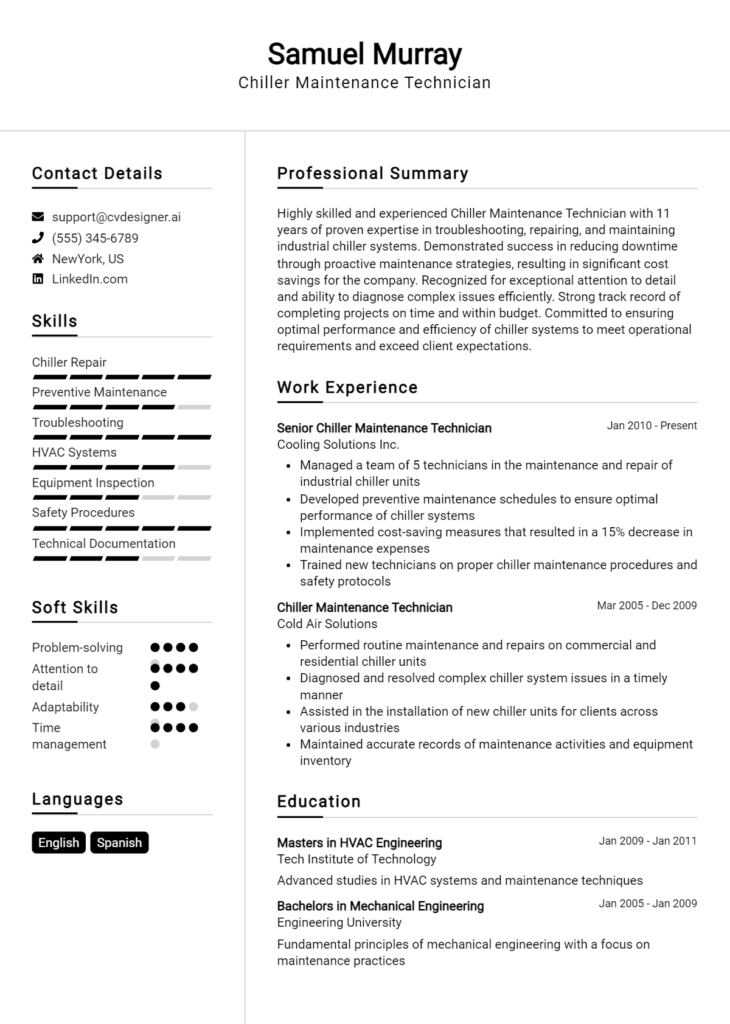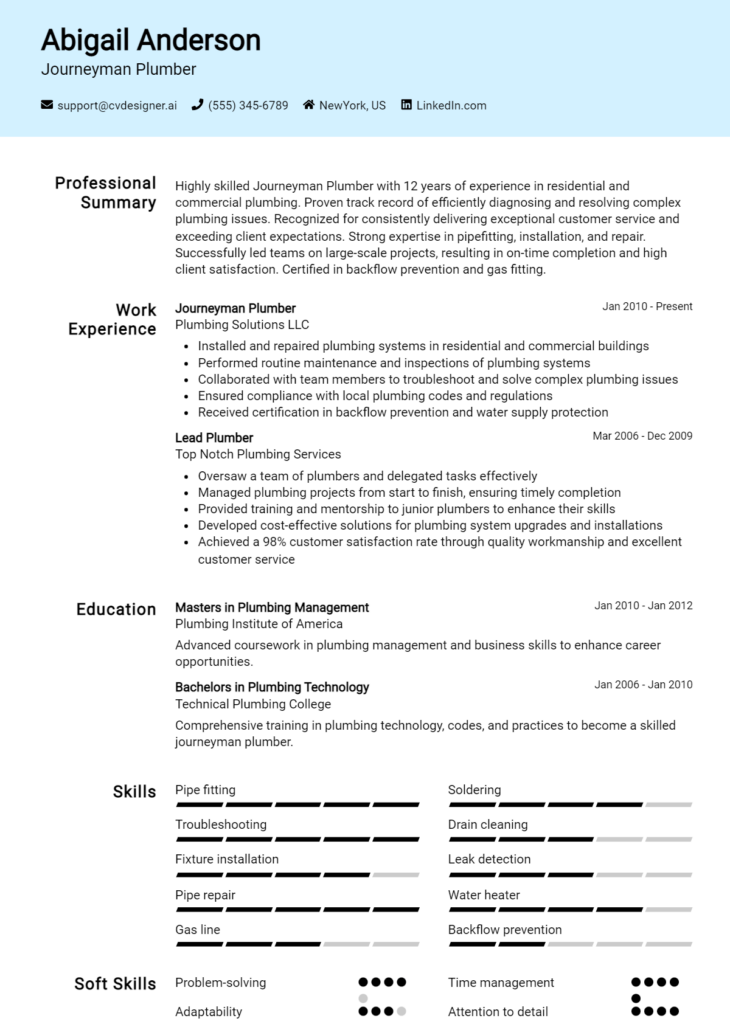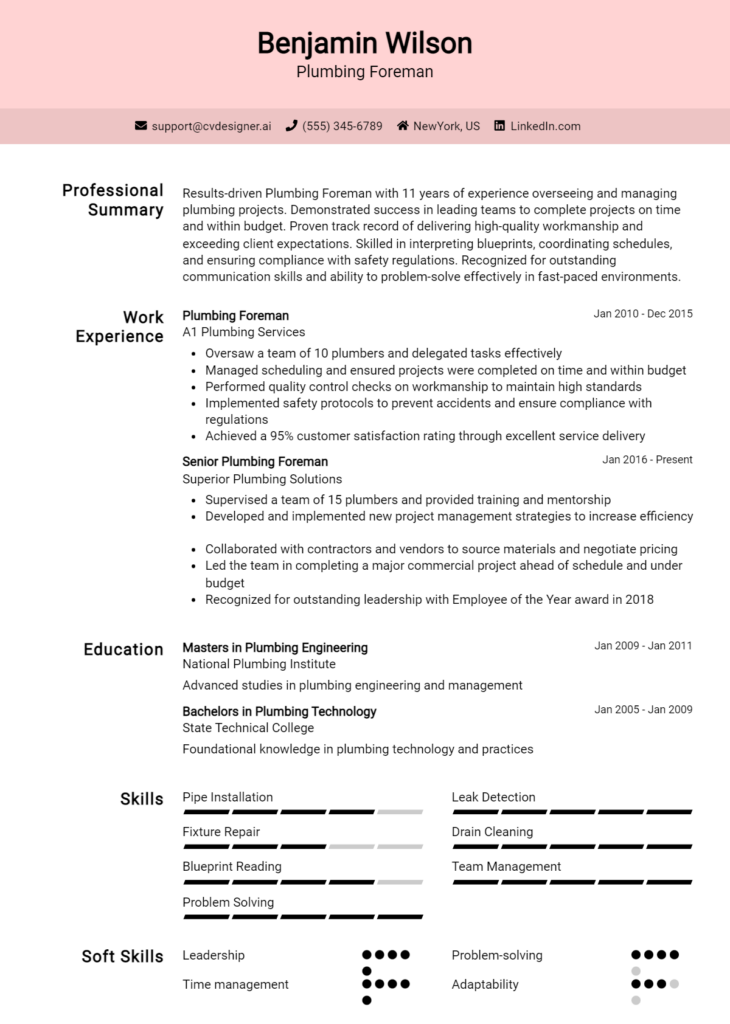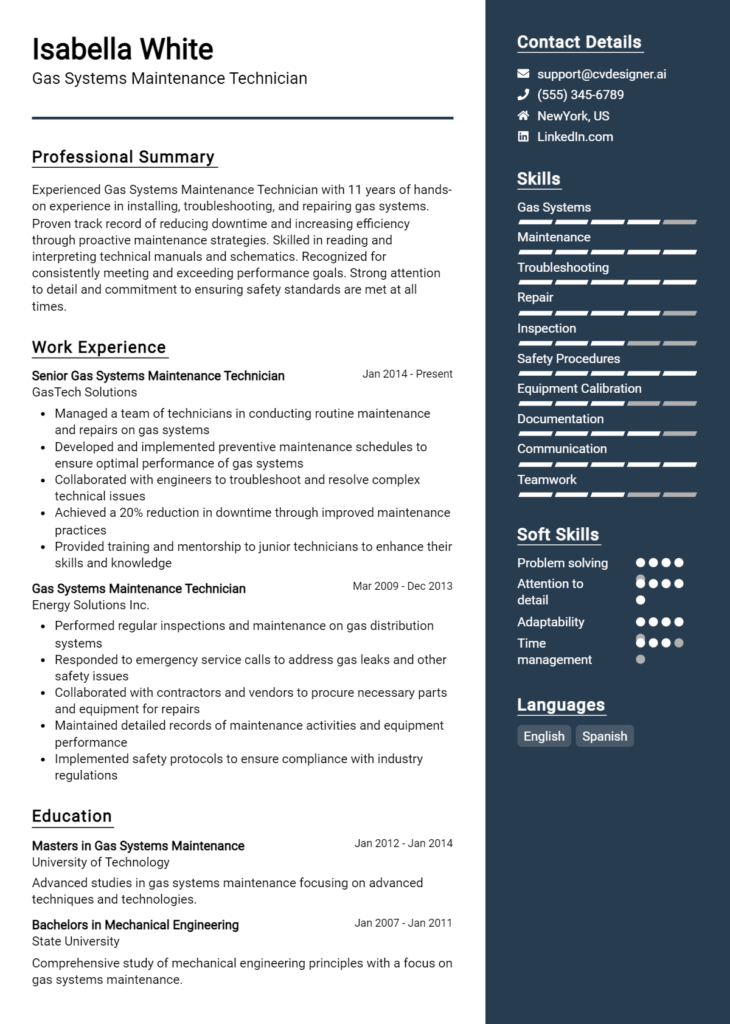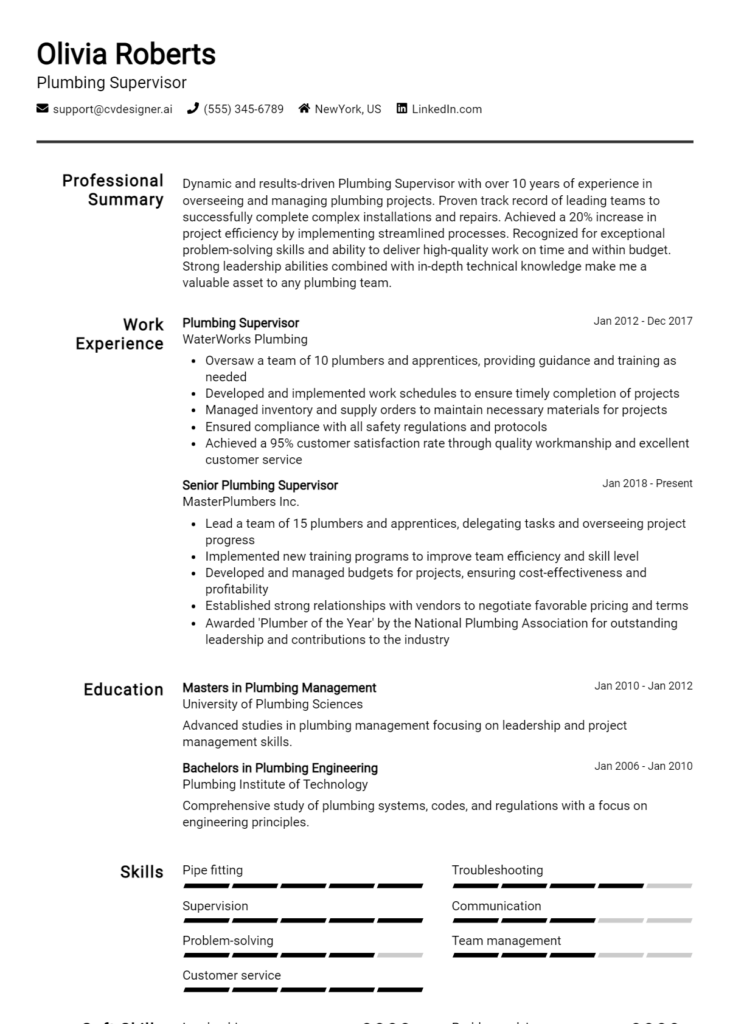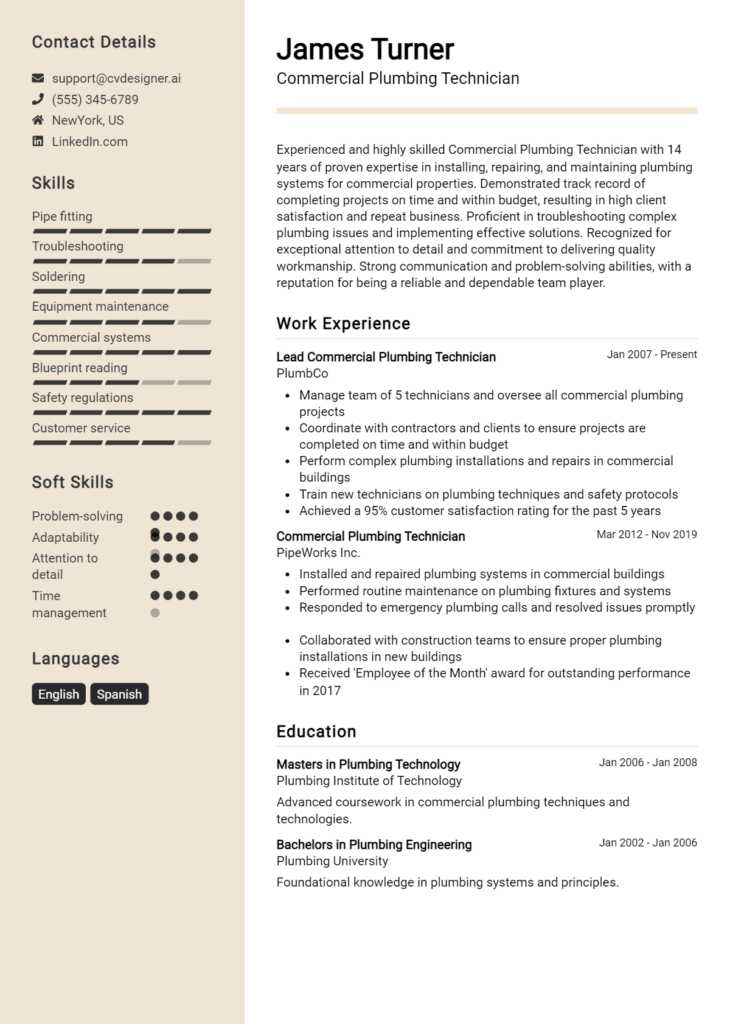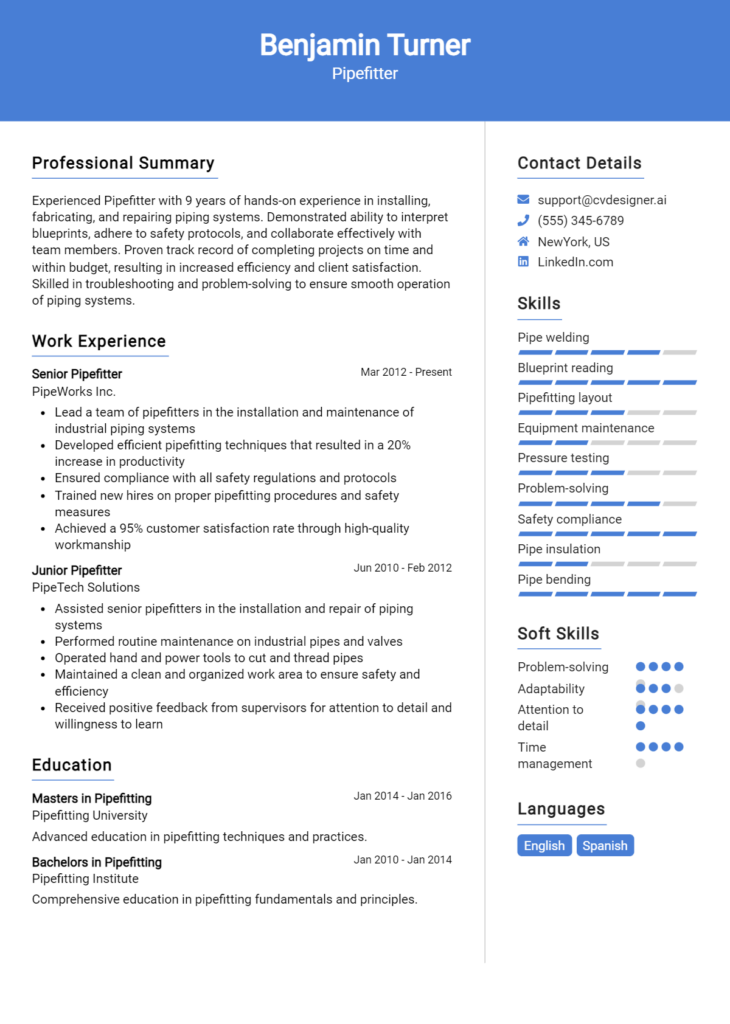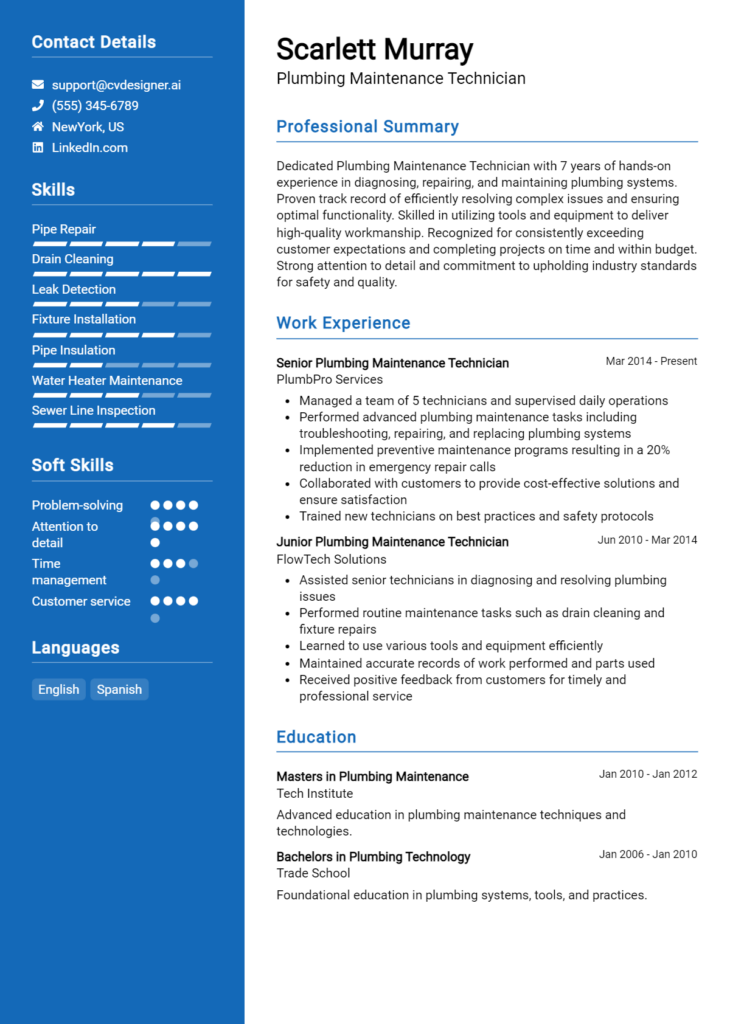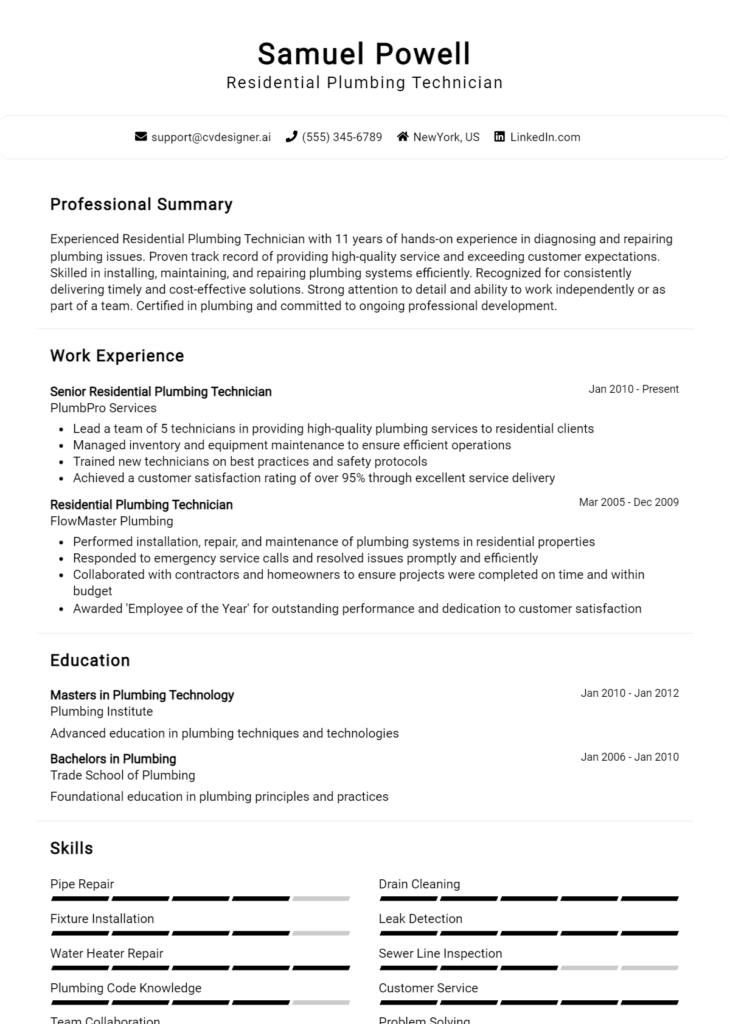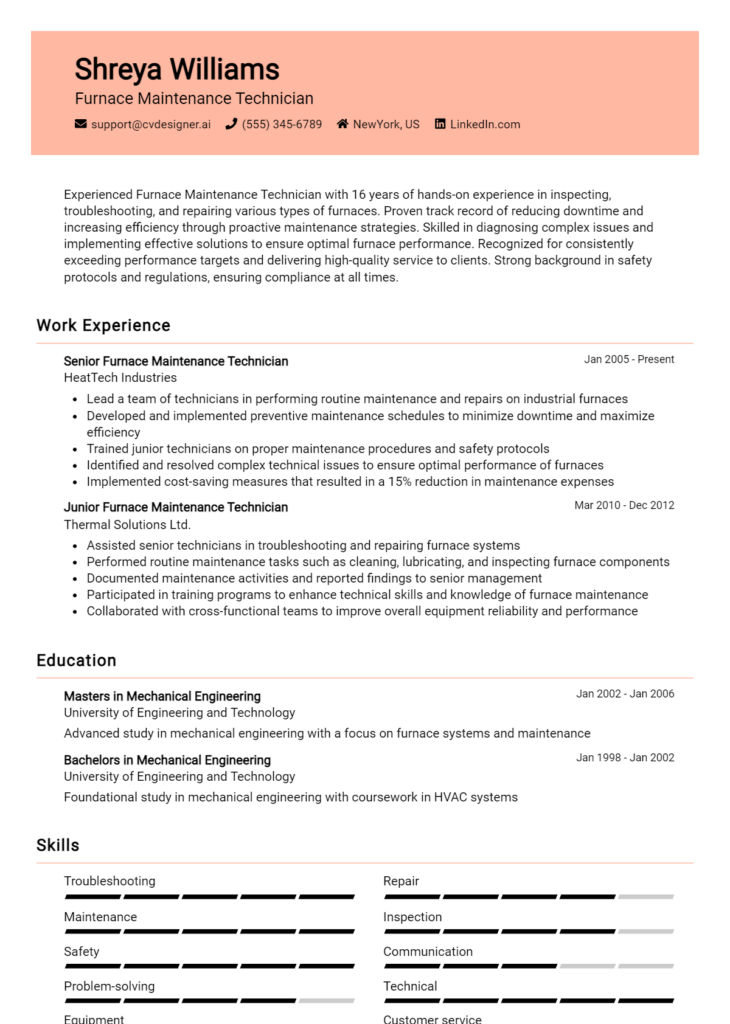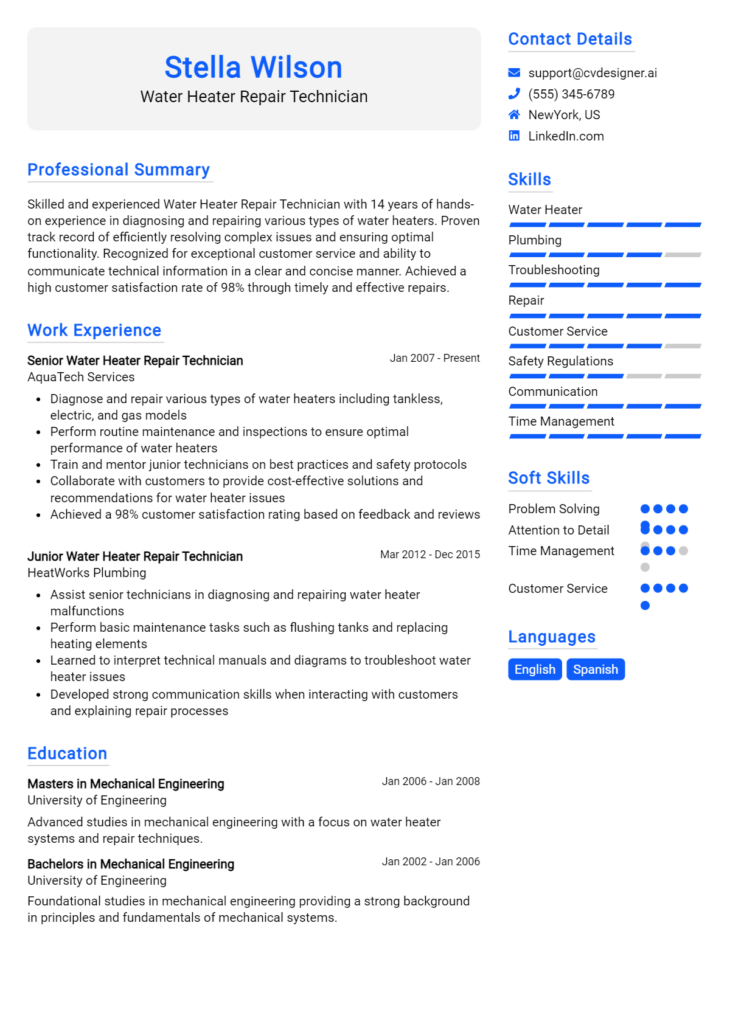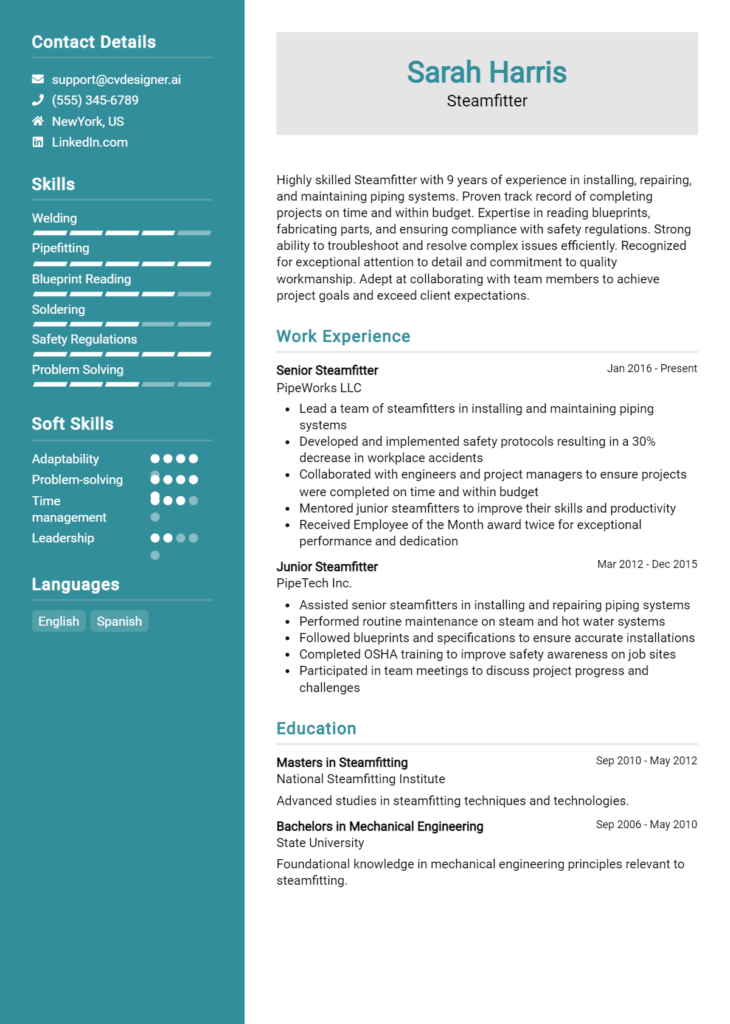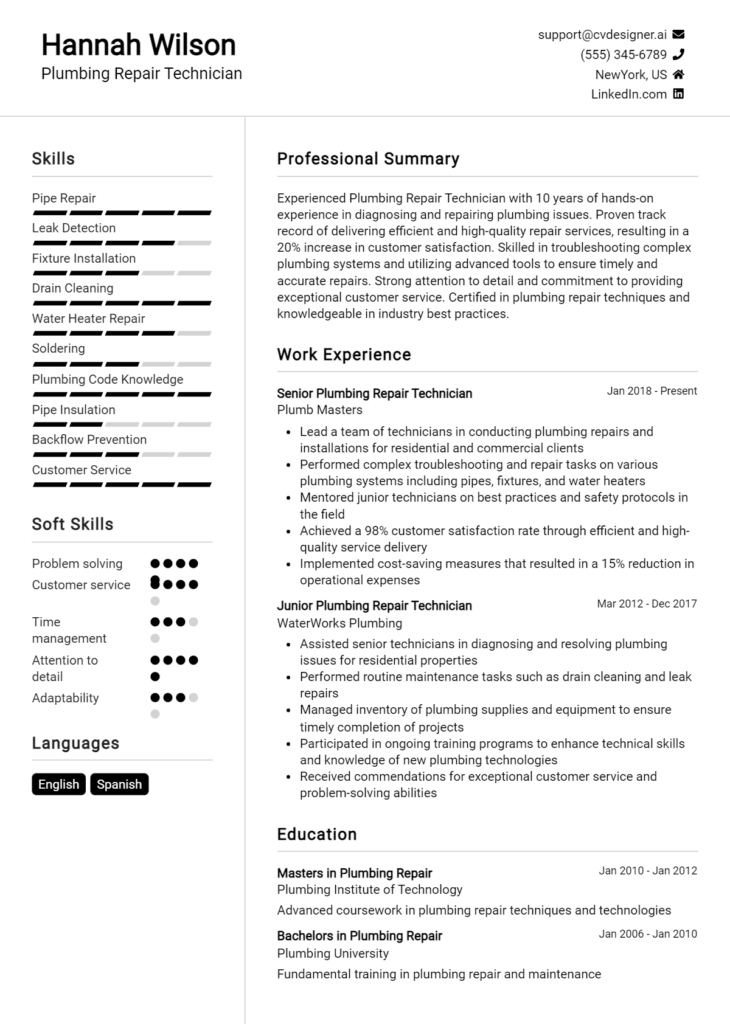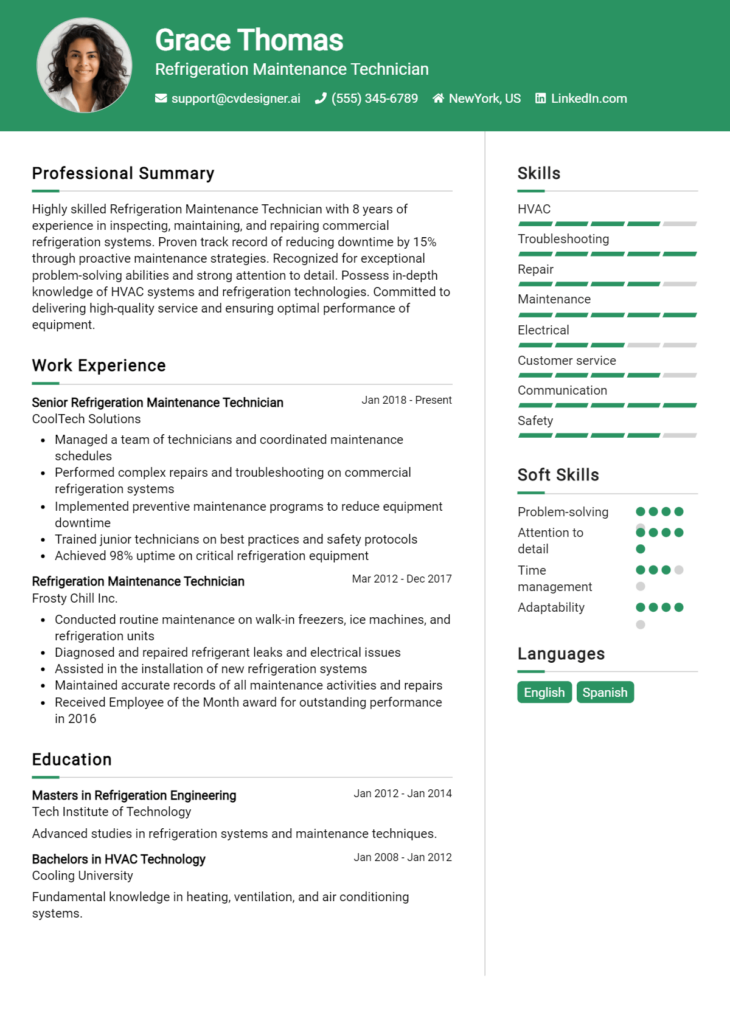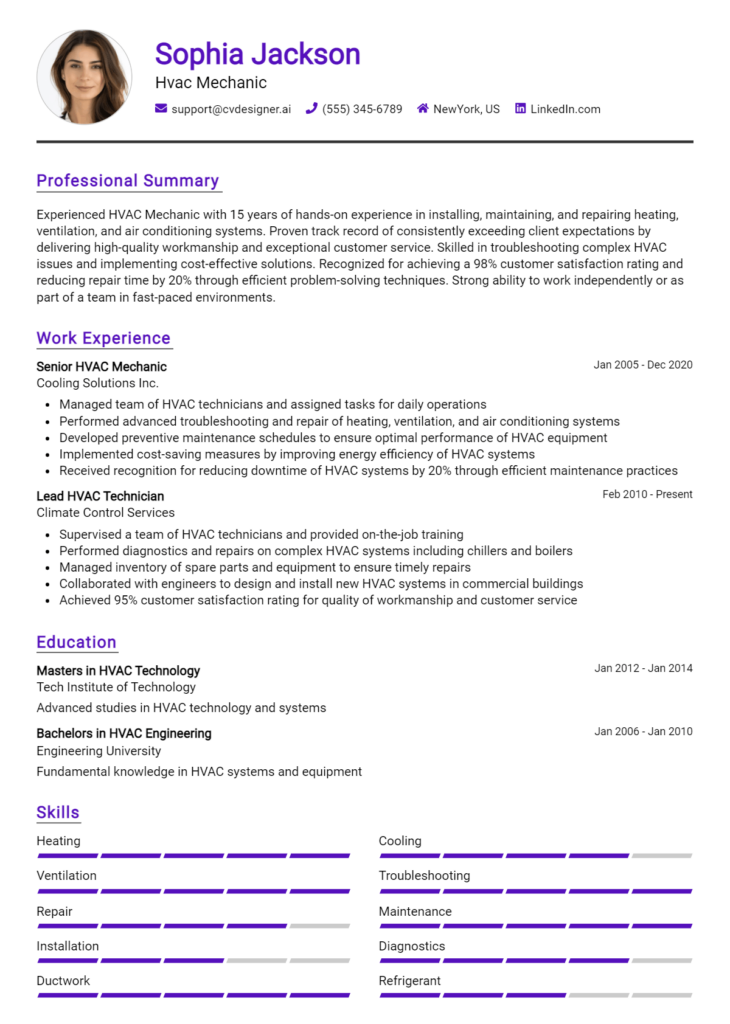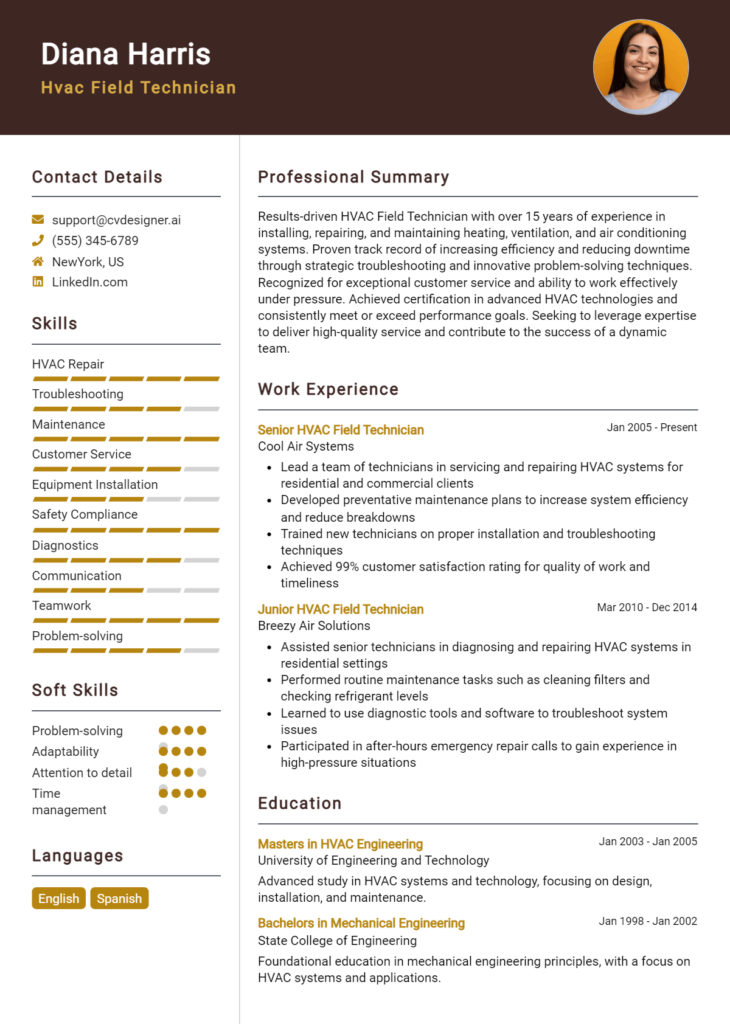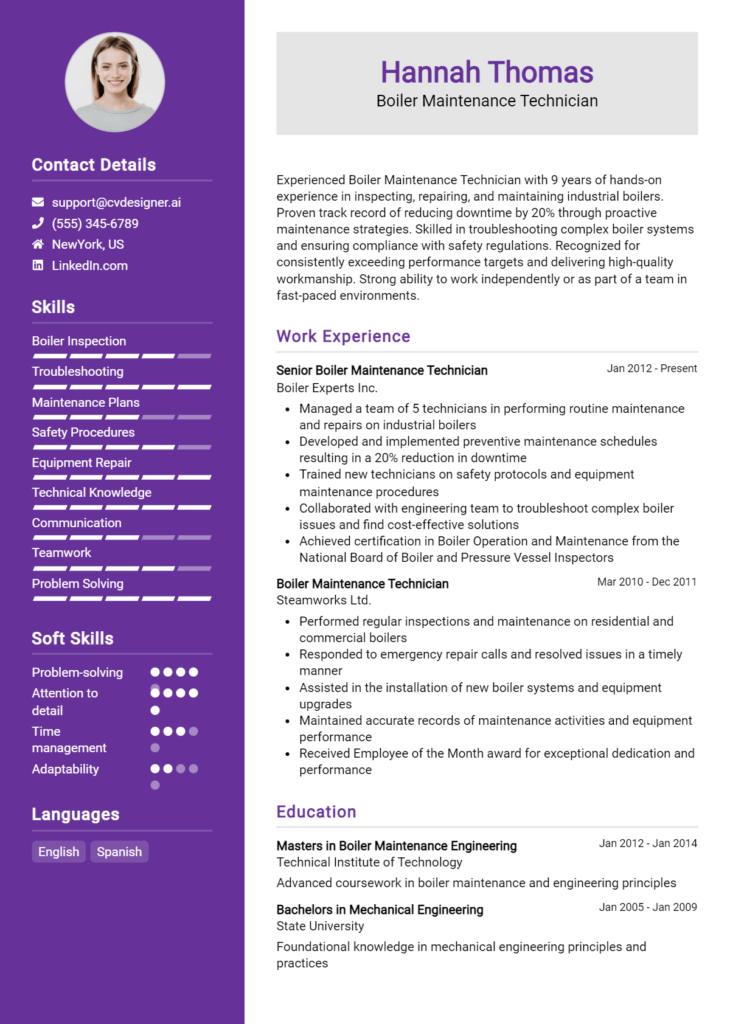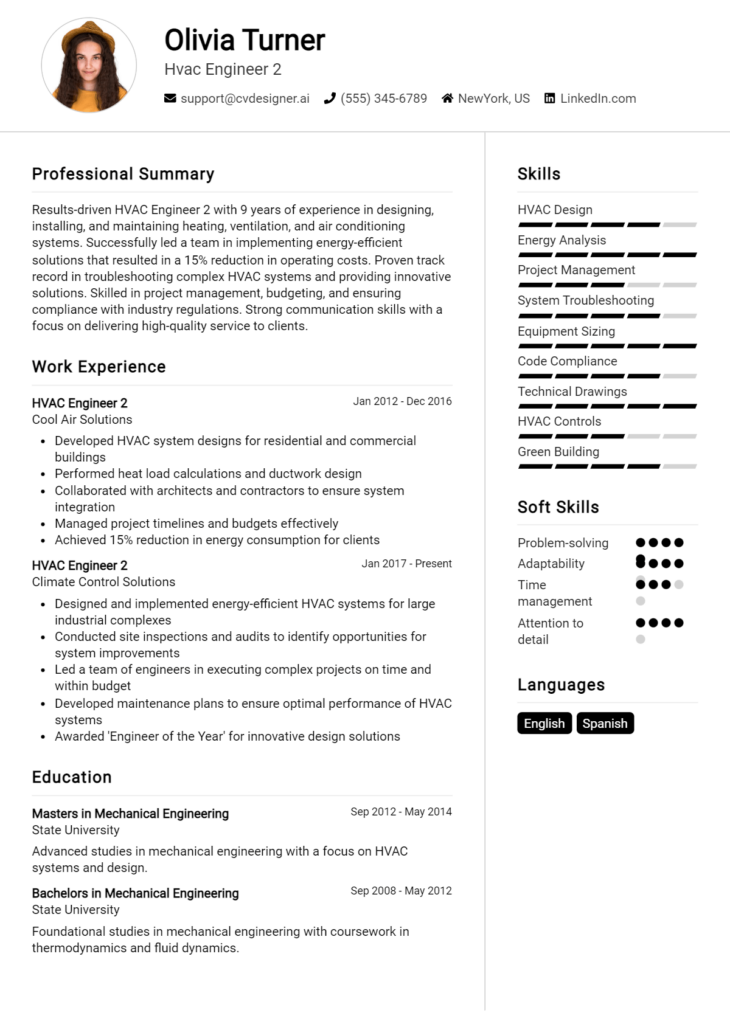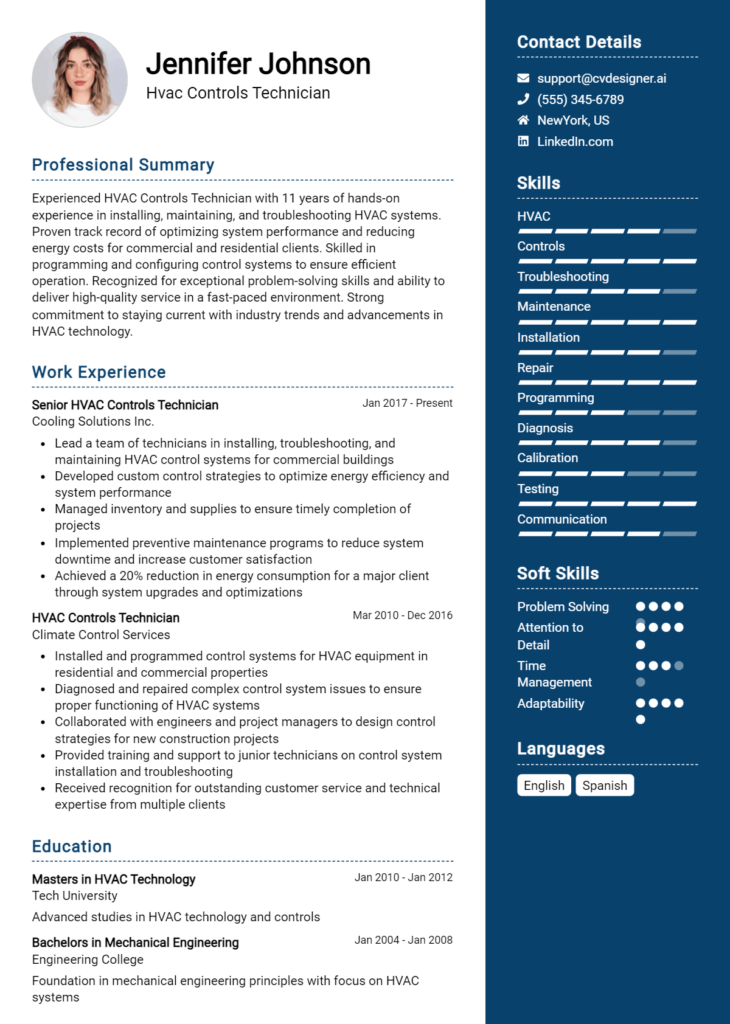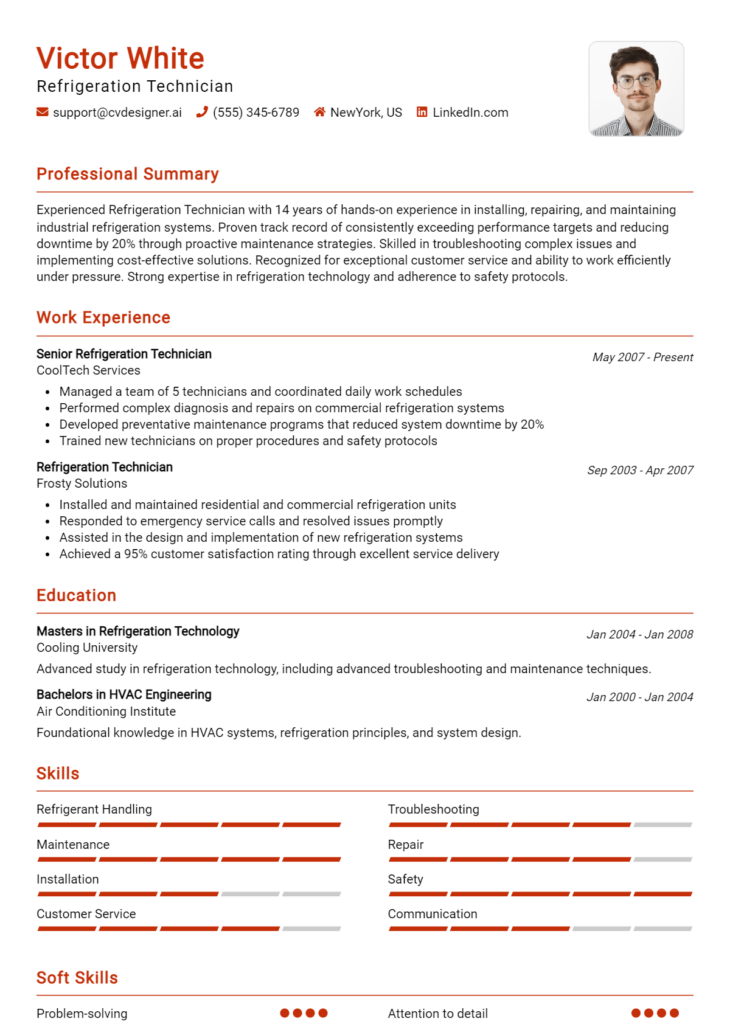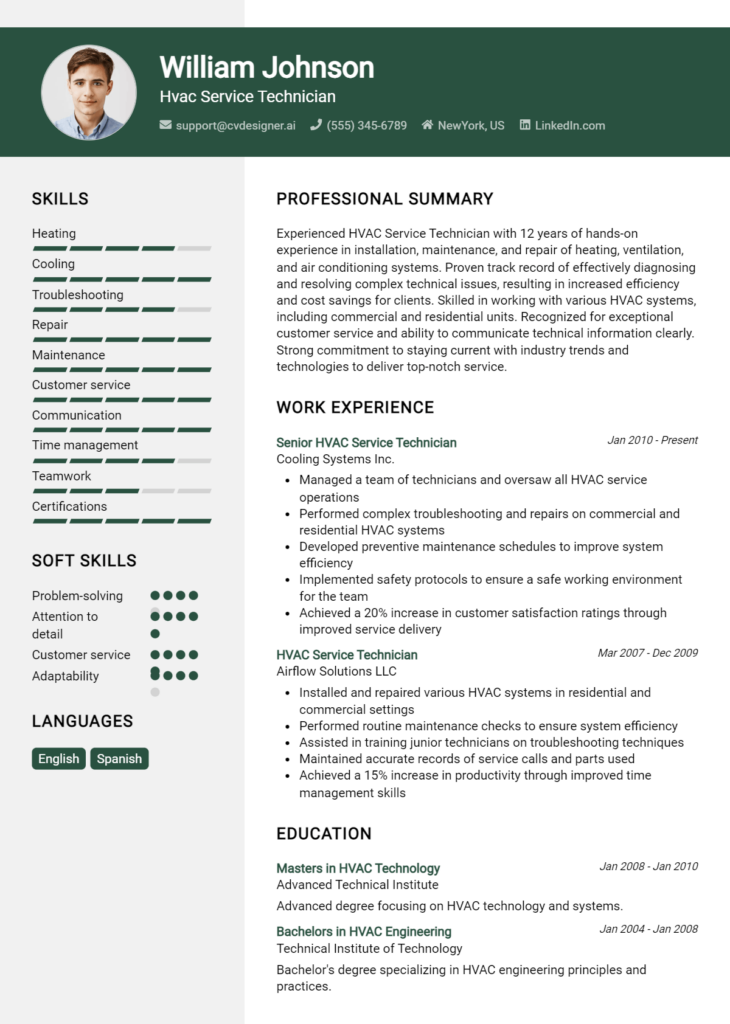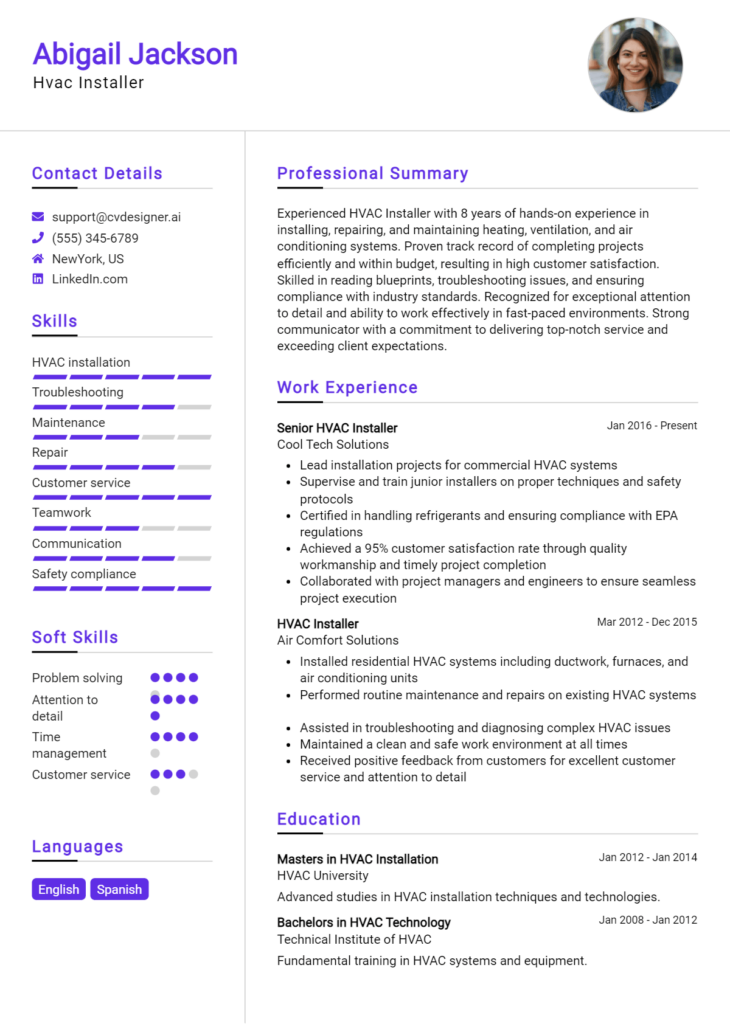HVAC Technician Core Responsibilities
HVAC Technicians play a crucial role in maintaining and repairing heating, ventilation, and air conditioning systems, bridging the gap between engineering, operations, and customer service. Their key responsibilities include diagnosing issues, performing routine maintenance, and ensuring compliance with safety regulations. Technical skills, operational knowledge, and strong problem-solving abilities are essential for success in this role. These competencies contribute significantly to the organization's efficiency and customer satisfaction, making a well-structured resume vital for showcasing these qualifications.
Common Responsibilities Listed on HVAC Technician Resume
- Conducting routine inspections and maintenance on HVAC systems
- Diagnosing and troubleshooting system malfunctions
- Installing new HVAC equipment and ensuring proper functionality
- Repairing or replacing defective parts and components
- Maintaining accurate records of service and repairs
- Ensuring compliance with local and national safety regulations
- Interpreting technical drawings and specifications
- Providing excellent customer service and support
- Collaborating with other professionals, such as electricians and plumbers
- Staying updated on industry trends and technology advancements
- Managing inventory and ordering necessary supplies
High-Level Resume Tips for HVAC Technician Professionals
A well-crafted resume is essential for HVAC Technician professionals as it serves as the first impression a candidate makes on potential employers. In a competitive job market, your resume must not only reflect your technical skills but also showcase your achievements and experiences that align with the specific needs of the employer. A clear, concise, and tailored resume can set you apart from other candidates, making it crucial to invest time and effort into its development. This guide will provide practical and actionable resume tips specifically designed for HVAC Technician professionals, ensuring your application effectively highlights your qualifications.
Top Resume Tips for HVAC Technician Professionals
- Tailor your resume to the job description by incorporating relevant keywords and phrases that match the employer's requirements.
- Showcase your technical skills prominently, including HVAC systems, thermodynamics, electrical systems, and troubleshooting abilities.
- Quantify your achievements with specific metrics, such as the number of installations completed, energy savings achieved, or improvements in customer satisfaction ratings.
- Highlight relevant certifications, such as EPA 608, NATE certification, or any specialized training in HVAC technology.
- Include a summary statement at the top of your resume that captures your key qualifications and career goals in the HVAC field.
- List your work experience in reverse chronological order, focusing on roles that demonstrate your expertise and contributions to previous employers.
- Incorporate any relevant soft skills, such as communication, problem-solving, and customer service, which are vital in the HVAC industry.
- Utilize bullet points for clarity and ease of reading, allowing hiring managers to quickly grasp your qualifications.
- Keep your resume to one page if possible, especially if you have less than 10 years of experience, to maintain focus and clarity.
- Proofread carefully for spelling and grammatical errors, as a polished resume reflects professionalism and attention to detail.
By implementing these tips, HVAC Technician professionals can significantly increase their chances of landing a job in the field. A targeted and effective resume not only highlights your skills and experiences but also positions you as a strong candidate who understands the industry's demands. Taking the time to refine your resume can lead to more interview opportunities and ultimately, a successful career in HVAC technology.
Writing an Exceptional HVAC Technician Resume Summary
A resume summary is a critical component of an HVAC Technician's job application, serving as the first impression that candidates make on hiring managers. A strong summary succinctly encapsulates key skills, relevant experience, and notable accomplishments, quickly capturing the attention of potential employers. By effectively highlighting the most pertinent attributes for the job role, candidates can stand out in a competitive job market. It is essential that this section is concise, impactful, and tailored to align with the specific job description, ensuring that the technician’s qualifications resonate with the needs of the employer.
Best Practices for Writing a HVAC Technician Resume Summary
- Quantify Achievements: Use numbers to demonstrate your impact, such as the percentage of energy savings achieved or the number of systems installed.
- Focus on Relevant Skills: Highlight technical skills and certifications that are directly applicable to the HVAC role.
- Tailor to the Job Description: Customize your summary to reflect the specific requirements and keywords mentioned in the job posting.
- Keep it Concise: Aim for 2-4 sentences that effectively communicate your qualifications without overwhelming the reader.
- Use Action Verbs: Start sentences with strong action verbs to convey confidence and proactivity.
- Highlight Industry Experience: Mention years of experience in HVAC and any specialized areas of expertise.
- Showcase Problem-Solving Abilities: Include examples of how you have resolved complex issues or improved processes.
- Include Soft Skills: Don’t forget to mention interpersonal skills, such as communication and teamwork, that are vital in service-oriented roles.
Example HVAC Technician Resume Summaries
Strong Resume Summaries
Detail-oriented HVAC Technician with over 7 years of experience in system installation and maintenance. Successfully reduced energy costs by 30% for clients through efficient system upgrades and proactive maintenance schedules.
Certified HVAC Specialist with a proven track record of troubleshooting and repairing complex heating and cooling systems. Achieved a 95% customer satisfaction rating through effective communication and timely service delivery.
Dedicated HVAC Technician with 10 years of hands-on experience. Spearheaded a project that improved system efficiency by 25%, leading to significant cost savings for a major commercial client.
Skilled HVAC Technician with expertise in residential and commercial systems. Successfully installed over 200 HVAC units, ensuring compliance with all safety regulations and enhancing indoor air quality for clients.
Weak Resume Summaries
Experienced HVAC Technician looking for a job. I have done various tasks in the field.
Hardworking technician with some experience in HVAC. I am a team player and willing to learn more.
The examples provided illustrate the distinction between strong and weak resume summaries effectively. Strong summaries are characterized by their specificity, quantifiable achievements, and relevant skills tailored to the HVAC field. In contrast, weak summaries lack detail and clarity, failing to convey measurable outcomes or unique qualifications that would attract the interest of hiring managers.
Work Experience Section for HVAC Technician Resume
The work experience section of an HVAC Technician resume is a critical component that demonstrates a candidate's technical skills and practical knowledge in the field. This section not only highlights the candidate's ability to manage teams effectively but also showcases their commitment to delivering high-quality products and services. By quantifying achievements—such as the number of systems installed, efficiency improvements, or successful project completions—and aligning experiences with industry standards, candidates can significantly enhance their appeal to potential employers.
Best Practices for HVAC Technician Work Experience
- Focus on specific technical skills relevant to HVAC systems, including installation, maintenance, and repair.
- Quantify achievements by including metrics such as energy savings, customer satisfaction ratings, or project timelines.
- Highlight leadership roles in team projects to showcase your ability to manage and motivate others.
- Use action verbs to describe your responsibilities and contributions effectively.
- Align your experiences with industry standards and best practices to demonstrate your knowledge of current technologies.
- Include relevant certifications and training that enhance your qualifications and expertise.
- Tailor your work experience to match the specific requirements of the job you are applying for.
- Emphasize collaboration with other trades and stakeholders to highlight your teamwork skills.
Example Work Experiences for HVAC Technician
Strong Experiences
- Successfully led a team of technicians in the installation of over 150 HVAC systems, resulting in a 20% increase in energy efficiency for clients.
- Implemented a preventive maintenance program that reduced system failures by 30%, improving customer satisfaction scores by 15%.
- Collaborated with engineering teams to design and execute a new ventilation system that decreased operational costs by 25% for a commercial facility.
- Trained and mentored junior technicians, enhancing their technical skills and improving team productivity by 40%.
Weak Experiences
- Worked on HVAC systems occasionally.
- Assisted with installations and repairs.
- Performed maintenance tasks without any specific outcomes.
- Helped other team members when needed.
The examples provided illustrate the difference between strong and weak experiences in an HVAC Technician resume. Strong experiences are characterized by specific achievements and quantifiable results that clearly demonstrate the candidate's technical expertise and leadership abilities. In contrast, weak experiences lack detail, specificity, and measurable outcomes, making it difficult for potential employers to assess the candidate's true capabilities and contributions to previous roles.
Education and Certifications Section for HVAC Technician Resume
The education and certifications section of an HVAC Technician resume is crucial as it serves as a testament to the candidate's academic background and professional qualifications. This section highlights the necessary training and certifications that demonstrate not only the candidate's technical expertise but also their commitment to continuous learning and staying updated with industry standards. By providing relevant coursework, certifications, and any specialized training, candidates can greatly enhance their credibility and show potential employers they are well-prepared to meet the demands of the HVAC field.
Best Practices for HVAC Technician Education and Certifications
- List only relevant degrees and certifications that pertain to HVAC technology, such as an associate degree in HVAC or a certification from a recognized organization.
- Include details about specific training programs or apprenticeships that provide hands-on experience in the field.
- Highlight any advanced certifications such as EPA Section 608 Certification, NATE Certification, or HVAC Excellence Certification.
- Provide information about coursework that directly relates to HVAC systems, energy efficiency, and troubleshooting techniques.
- Use clear and concise descriptions to explain the significance of each certification and degree listed.
- Keep the section organized and easy to read by using bullet points and consistent formatting.
- Update the section regularly to include new certifications or educational achievements.
- Showcase any continuing education courses that reflect a commitment to professional development.
Example Education and Certifications for HVAC Technician
Strong Examples
- Associate Degree in HVAC Technology, XYZ Community College, Graduated May 2022
- NATE Certified HVAC Technician, Certification Number: 123456789, Valid until June 2025
- EPA Section 608 Certification, Type I, II, and III, Certification Number: ABC123456, Earned March 2023
- Completed Advanced Energy Efficiency Training, ABC Institute, April 2023
Weak Examples
- Bachelor’s Degree in Business Administration, ABC University, Graduated June 2020
- Certification in Basic Plumbing, XYZ Vocational School, Earned January 2018
- Outdated HVAC Certification from 2015, No longer valid
- High School Diploma with no relevant coursework related to HVAC
The strong examples are considered effective because they directly align with the skills and knowledge required for an HVAC Technician role, showcasing relevant training and current certifications that are recognized in the industry. Conversely, the weak examples lack relevance to the HVAC field, include outdated or non-specific qualifications, and do not demonstrate the candidate's commitment to maintaining current industry standards, which could hinder their credibility in the job market.
Top Skills & Keywords for HVAC Technician Resume
As an HVAC Technician, possessing the right skills is paramount to ensuring both efficiency and safety in heating, ventilation, and air conditioning systems. A well-crafted resume highlights these skills to showcase one's competency and versatility in the field. By effectively communicating both hard and soft skills, candidates can distinguish themselves in a competitive job market. Employers seek technicians who not only have technical expertise but also possess interpersonal qualities that enhance team collaboration and customer satisfaction. Therefore, it’s crucial to tailor your resume to reflect a comprehensive skill set that meets the demands of the HVAC industry.
Top Hard & Soft Skills for HVAC Technician
Soft Skills
- Communication
- Problem-solving
- Customer service
- Attention to detail
- Teamwork
- Time management
- Adaptability
- Critical thinking
- Dependability
- Initiative
Hard Skills
- Electrical systems knowledge
- Refrigeration techniques
- HVAC system design
- Troubleshooting and repair
- Installation procedures
- Understanding of building codes
- Preventive maintenance
- Thermodynamics principles
- Energy efficiency knowledge
- Proficiency in using HVAC tools and equipment
To further enhance your resume, consider exploring additional skills and effectively highlighting your work experience in the HVAC field.
Stand Out with a Winning HVAC Technician Cover Letter
Dear [Hiring Manager's Name],
I am writing to express my interest in the HVAC Technician position at [Company Name], as advertised on [Job Board/Company Website]. With over [X years] of hands-on experience in the HVAC industry, I have developed a strong skill set that includes installation, maintenance, and repair of heating, ventilation, and air conditioning systems. I am passionate about providing efficient and reliable HVAC solutions to enhance indoor comfort and energy efficiency for clients. My technical expertise, combined with my commitment to excellent customer service, makes me a valuable addition to your team.
In my previous role at [Previous Company Name], I successfully managed a variety of HVAC projects, from residential installations to commercial system overhauls. I am adept at diagnosing and troubleshooting issues, ensuring that systems operate at peak performance. My certifications, including [relevant certifications], have equipped me with the knowledge necessary to work with the latest technologies and comply with industry standards. Additionally, I pride myself on staying updated with advancements in HVAC technology, which allows me to recommend innovative solutions that meet the specific needs of my clients.
Moreover, I understand the importance of effective communication and collaboration within a team. I have often worked alongside contractors and other tradespeople to ensure that projects are completed on time and within budget. My commitment to safety and adherence to regulations has consistently resulted in a zero-incident work environment. I am excited about the possibility of bringing my skills and dedication to the team at [Company Name] and contributing to your reputation for outstanding service.
Thank you for considering my application. I look forward to the opportunity to discuss how my background, skills, and enthusiasms align with the goals of [Company Name]. I am eager to contribute to your continued success and am available at your earliest convenience for an interview.
Sincerely,
[Your Name]
[Your Phone Number]
[Your Email Address]
[Your LinkedIn Profile (if applicable)]
Common Mistakes to Avoid in a HVAC Technician Resume
When crafting a resume for an HVAC Technician position, it's essential to present your skills and experiences effectively. Unfortunately, many candidates make common mistakes that can hinder their chances of landing an interview. Understanding these pitfalls can help you create a more compelling and professional resume that stands out to employers. Below are some of the most frequent mistakes to avoid:
Generic Objective Statement: Using a one-size-fits-all objective can make your resume forgettable. Tailor your objective to reflect your specific career goals and how they align with the job you’re applying for.
Lack of Relevant Certifications: Failing to include important certifications like EPA 608 or NATE can make your resume less competitive. Ensure you list all relevant credentials that showcase your qualifications.
Inadequate Work Experience Details: Simply listing job titles without describing your responsibilities and accomplishments can be a missed opportunity. Use action verbs and quantify your achievements to demonstrate your impact in previous roles.
Ignoring Technical Skills: HVAC work requires a specific set of technical skills. Neglecting to highlight your proficiency with tools, systems, and technologies related to HVAC can make your resume less appealing to employers.
Poor Formatting: A cluttered or unprofessional layout can distract from your qualifications. Use clear headings, bullet points, and consistent formatting to make your resume easy to read.
Omitting Soft Skills: While technical skills are crucial, soft skills like communication, problem-solving, and customer service are equally important in this field. Highlight these skills to show you can interact effectively with clients and team members.
Not Customizing for Each Job Application: Sending the same resume for every application is a common mistake. Customize your resume to match the specific requirements and keywords mentioned in the job description to improve your chances of getting noticed.
Neglecting Proofreading: Spelling and grammatical errors can create a negative impression. Always proofread your resume multiple times or ask someone else to review it to ensure it’s polished and professional.
Conclusion
In conclusion, becoming a successful HVAC Technician requires a blend of technical skills, knowledge of systems, and the ability to troubleshoot and problem-solve effectively. Throughout this article, we've highlighted the essential qualifications, certifications, and experience needed to excel in this role. Additionally, we discussed the importance of staying updated with industry trends and continuing education to remain competitive.
Now is the perfect time to ensure your resume reflects your skills and experiences accurately. Don't leave your future to chance—take the initiative to enhance your job application materials. We encourage you to review your HVAC Technician resume and consider utilizing the various tools available to you.
Explore our resume templates to find a design that fits your style, use our resume builder for a user-friendly experience, and check out resume examples for inspiration. Also, don't forget to craft a compelling cover letter with our cover letter templates.
Take action today and set yourself up for success in your HVAC career!

